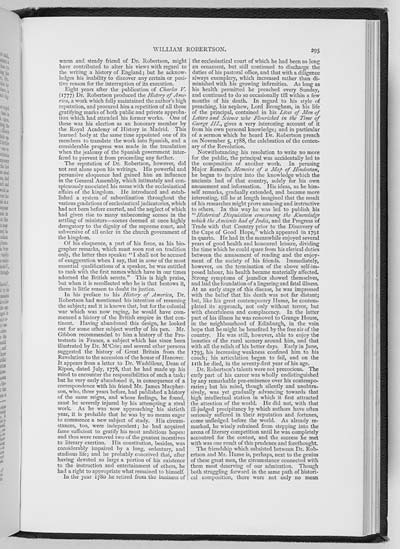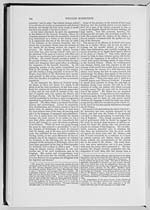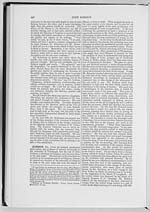295
warm and steady friend of Dr. Robertson, might
have contributed to alter his views with regard to
the writing a history of England; but he acknow-
ledges his inability to discover any certain or posi-
tive reason for the interruption of its execution.
Eight years after the publication of Charles V.
(1777) Dr. Robertson produced the History of Ame-
rica, a work which fully maintained the author's high
reputation, and procured him a repetition of all those
gratifying marks of both public and private approba-
tion which had attended his former works. One of
these was his election as an honorary member by
the Royal Academy of History in Madrid. This
learned body at the same time appointed one of its
members to translate the work into Spanish, and a
considerable progress was made in the translation
when the jealousy of the Spanish government inter-
fered to prevent it from proceeding any further.
The reputation of Dr. Robertson, however, did
not rest alone upon his writings. His powerful and
persuasive eloquence had gained him an influence
in the General Assembly, which intimately and con-
spicuously associated his name with the ecclesiastical
affairs of the kingdom. He introduced and estab-
lished a system of subordination throughout the
various gradations of ecclesiastical judicatories, which
had not been before exerted, and the neglect of which
had given rise to many unbecoming scenes in the
settling of ministers�scenes deemed at once highly
derogatory to the dignity of the supreme court, and
subversive of all order in the church government of
the kingdom.
Of his eloquence, a part of his fame, as his bio-
grapher remarks, which must soon rest on tradition
only, the latter thus speaks: "I shall not be accused
of exaggeration when I say, that in some of the most
essential qualifications of a speaker, he was entitled
to rank with the first names which have in our times
adorned the British senate." This is high praise,
but when it is recollected who he is that bestows it,
there is little reason to doubt its justice.
In his preface to his History of America, Dr.
Robertson had mentioned his intention of resuming
the subject; and it is known that, but for the colonial
war which was now raging, he would have com-
menced a history of the British empire in that con-
tinent. Having abandoned this design, he looked
out for some other subject worthy of his pen. Mr.
Gibbon recommended to him a history of the Pro-
testants in France, a subject which has since been
illustrated by Dr. M'Crie; and several other persons
suggested the history of Great Britain from the
Revolution to the accession of the house of Hanover.
It appears from a letter to Dr. Waddilour, Dean of
Ripon, dated July, 1778, that he had made up his
mind to encounter the responsibilities of such a task:
but he very early abandoned it, in consequence of a
correspondence with his friend Mr. James Macpher-
son, who, three years before, had published a history
of the same reigns, and whose feelings, he found,
must be severely injured by his attempting a rival
work. As he was now approaching his sixtieth
year, it is probable that he was by no means eager
to commence a new subject of study. His circum-
stances, too, were independent; he had acquired
fame sufficient to gratify his most ambitious hopes:
and thus were removed two of the greatest incentives
to literary exertion. His constitution, besides, was
considerably impaired by a long, sedentary, and
studious life; and he probably conceived that, after
having devoted so large a portion of his existence
to the instruction and entertainment of others, he
had a right to appropriate what remained to himself.
In the year 1780 he retired from the business of
the ecclesiastical court of which he had been so long
an ornament, but still continued to discharge the
duties of his pastoral office, and that with a diligence
always exemplary, which increased rather than di-
minished with his growing infirmities. As long as
his health permitted he preached every Sunday,
and continued to do so occasionally till within a few
months of his death. In regard to his style of
preaching, his nephew, Lord Brougham, in his life
of the principal, contained in his Lives of Men of
Letters and Science who Flourished in the Time of
George III., gives a very interesting account of it
from his own personal knowledge; and in particular
of a sermon which he heard Dr. Robertson preach
on November 5, 1788, the celebration of the centen-
ary of the Revolution.
Notwithstanding his resolution to write no more
for the public, the principal was accidentally led to
the composition of another work. In perusing
Major Rennel's Memoirs of a Map of Hindostan,
he began to inquire into the knowledge which the
ancients had of that country, solely for his own
amusement and information. His ideas, as he him-
self remarks, gradually extended, and became more
interesting, till he at length imagined that the result
of his researches might prove amusing and instructive
to others. In this way he was led to publish his
"Historical Disquisition concerning the Knowledge
which the Ancients had of India, and the Progress of
Trade with that Country prior to the Discovery of
the Cape of Good Hope, which appeared in 1791
in quarto. He had in the meanwhile enjoyed several
years of good health and honoured leisure, dividing
the time which he could spare from his clerical duties
between the amusement of reading and the enjoy-
ment of the society of his friends. Immediately,
however, on the termination of the above self-im-
posed labour, his health became materially affected.
Strong symptoms of jaundice showed themselves,
and laid the foundation of a lingering and fatal illness.
At an early stage of this disease, he was impressed
with the belief that his death was not far distant;
but, like his great contemporary Hume, he contem-
plated its approach, not only without terror, but
with cheerfulness and complacency. In the latter
part of his illness he was removed to Grange House,
in the neighbourhood of Edinburgh, in the vain
hope that he might be benefited by the free air of the
country. He was still, however, able to enjoy the
beauties of the rural scenery around him, and that
with all the relish of his better days. Early in June,
1793, his increasing weakness confined him to his
couch; his articulation began to fail, and on the
nth he died, in the seventy-first year of his age.
Dr. Robertson's talents were not precocious. The
early part of his career was wholly undistinguished
by any remarkable pre-eminence over his contempo-
raries ; but his mind, though silently and unobtru-
sively, was yet gradually advancing towards that
high intellectual station in which it first attracted
the attention of the world. He did not, with that
ill-judged precipitancy by which authors have often
seriously suffered in their reputation and fortunes,
come unfledged before the world. As already re-
marked, he wisely refrained from stepping into the
arena of literary competition until he was completely
accoutred for the contest, and the success he met
with was one result of this prudence and forethought.
The friendship which subsisted between Dr. Rob-
ertson and Mr. Hume is, perhaps, next to the genius
of these great men, the circumstance connected with
them most deserving of our admiration. Though
both struggling forward in the same path of histori-
cal composition, there were not only no mean

![]() Universal Viewer |
Universal Viewer | ![]() Mirador |
Large image | Transcription
Mirador |
Large image | Transcription
![]()

